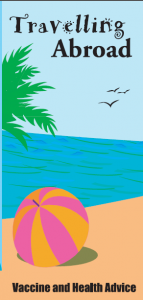
If you are travelling abroad you should visit your general practice to find out which vaccines you need. Ideally this should be at least 3 months before you travel. Do not leave it until the week before you go, as many vaccines need to be given a few weeks before travelling to ensure full effectiveness.
Your practice nurse or doctor will tell you which vaccines you need to get before travelling. Some of these vaccines will be available on the NHS but others are not. GPs can give the following vaccines on the NHS:
- Diphtheria
- Hepatitis A
- Polio
- Tetanus
- Typhoid
GPs cannot give the following vaccines on the NHS:
- Hepatitis B
- Japanese encephalitis
- Meningococcal
- Rabies
- Tick borne encephalitis
- Yellow fever
For vaccines that are not available on the NHS, your GP must write these vaccines on a private prescription. This should then be brought to a community pharmacy where it can be dispensed. A private prescription will usually be more expensive than a normal prescription charge. The GP can also charge you for the administration of these vaccines.
Storage of Vaccines
The vaccines should be stored appropriately, as advised by the community pharmacist until your appointment with your doctor or nurse who will then administer the vaccine.
Protection against malaria
If you are travelling to an area where you need to take medication against malaria, this must also be written on a private prescription. Some anti-malarial medications can be bought from your pharmacist without a prescription. Your general practice will advise you about the most appropriate preventative treatment for the country you are visiting.
Patients on long-term medication
If you have an illness that means that you regularly need to take medication,please ensure that you have enough with you to last for your whole holiday. If you are travelling for more than 3 months, you should find a doctor who can continue your care in the country that you are visiting.
Medication for travel abroad or travel kits
If you want to bring medicines on holiday with you that you do not normally take i.e. to use in case you become ill when abroad eg. antibiotics, these are not available on NHS prescription. If necessary your GP may issue a private prescription.
General travel health
- If you have any doubts about the quality of tap water, ensure that you drink, wash and clean your teeth with bottled water, or water that has been boiled or sterilised. Where possible, eat fresh food that has been thoroughly cooked. Shellfish should never be eaten raw and avoid salad, fruit or ice cubes that you have not prepared yourself.
- If you do get diarrhoea drink lots of fluids to avoid dehydration. You may wish to bring hydration drinks with you on holiday and you can buy these as sachets from your pharmacy to be added to water. You should eat as soon as you can. Anti-diarrhoea medicines can be taken to relieve symptoms of acute diarrhoea and these can also be bought at your pharmacy.
- Be sensible with alcohol when abroad and avoid dehydration in hot climates by drinking as much fluid as possible.
- Avoid over-exposure to the sun, which is strongest between 11am and 3pm.
- Use insect repellent to avoid insect bites. Apply repellent on top of sun block when both are being used.
